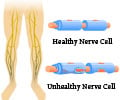Glossary
Peripheral nervous system: The nerves that branch out from the brain and spinal cord to the rest of the bodyCentral nervous system: Brain, spinal cord and their nerve endings
Electromyography (EMG): It is a test that assesses the health of the muscles and the nerves controlling the muscles
Nerve conduction studies: Demonstration of the presence and measurement of the speed of transmission of electrical impulses induced at a distance along a nerve, as a means of investigating the intactness of nerve supply and function
Neuritis: Inflammation of the nerves
Neuropathy: A problem in any part of the nervous system except the brain and spinal cord. Neuropathies can be caused by infection, toxic substances, or disease
Autoimmune disease: When the immune system mistakes self-tissues (self-antigens) as foreign antigen (non-self) and results in an inappropriate immune response it results in an autoimmune disease
Lyme disease: A disease caused by bacteria transmitted through the bite of a tick; characterised by fever, rash, and inflammation of the heart and joints
Idiopathic: Unknown cause
Muscular atrophy: Mental loss of interest in life or worldly matters
Muscular dystrophy: A rare genetic disorder in which muscles degenerate gradually and strength is lost
Atrophy: Wasting of tissue or an organ
Shingles: Nerve infection due to the herpes zoster virus
Fibromyalgia: It is also called ‘chronic fatigue syndrome’ and results in musculo-skeletal pain







